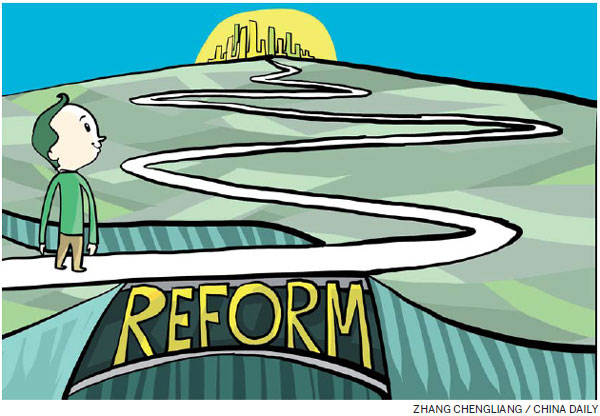
'Institutional barriers' cited as main factor impeding nation's progress
One of China's leading economists has made a strong call for the country's leaders to speed up reforms that have been delayed.
The appeal by Wu Jinglian comes as a top leadership meeting is scheduled to be held on Monday to map out the nation's development program for the next five years.
The Communist Party of China is holding its Central Committee plenum from Monday to Thursday to come up with a proposal for the 13th Five-Year Plan (2016-20).
The meeting will also fill high-level vacancies left by officials now facing graft charges, including 11 former Central Committee members and alternate members.
Wu, 85, is a researcher at the State Council Development Research Center and a veteran economic adviser to the central government from the early days of the nation's economic reform.
Speaking on Sunday at a Center for Industrial Development and Environmental Governance forum at Tsinghua University, Wu blamed what he called "institutional barriers" as the main factor for the slowdown in China's overall rise in productivity and the failure to meet the demands of its newly rich middle-class citizens.
The only solution is to forge ahead with reform, rather than to introduce continual financial stimulus measures, he said.
He criticized the attempt to use such measures to increase the speed of growth as being the wrong way to ease the nation's economic woes.
In some key areas, reforms to remove institutional barriers have been slower than they should be, despite the leadership's strong determination expressed in reform programs adopted since 2012, he said.
One of the areas is reform of the capital market and its supervision. Another, where many problems remain, is the government's fiscal management, "because too much debt was incurred from the government's financial stimulus programs after the 2008 global financial crisis," Wu said.
The effect of financial stimulus measures has fallen to such an extent as to be nearly useless now, as it has incurred huge debt for local governments and companies. Introducing more such measures for the economy is a wrong and unsustainable solution for China, Wu said.
Instead, he said it should concentrate on reforming the financial system, fiscal management, prices and pricing system, State-owned enterprises, building up tariff-free zones and further opening up to global investors.
Chen Qinghai, former dean of Tsinghua University's School of Economics and Management, said at the same forum that China's environmental challenge will be huge.
Last week, Ma Jun, chief economist at the People's Bank of China, said future financial reform will focus on general finance, innovation finance, Internet finance and environmental or green finance.
